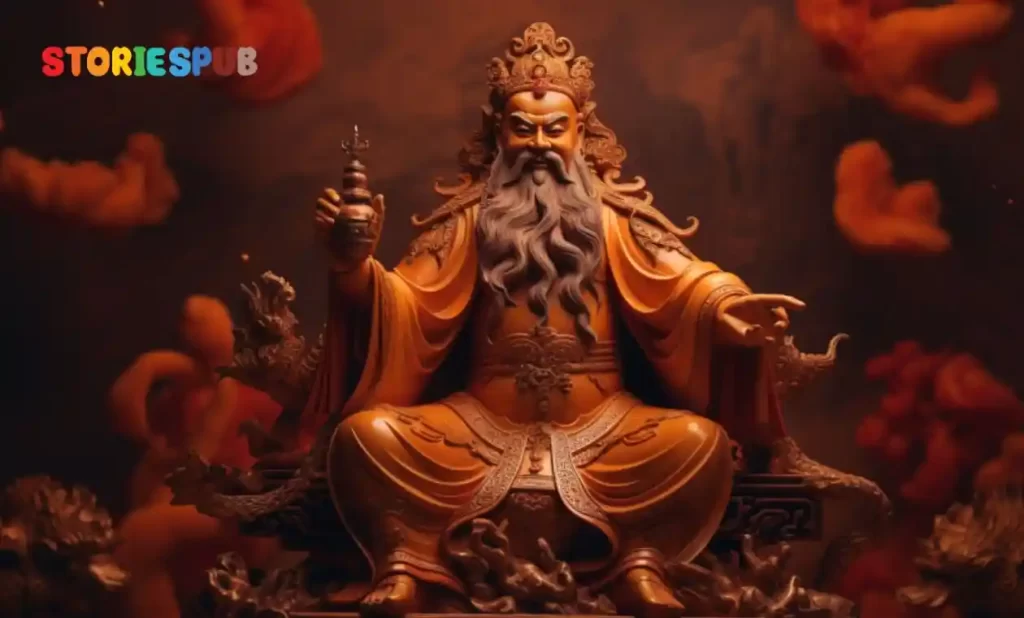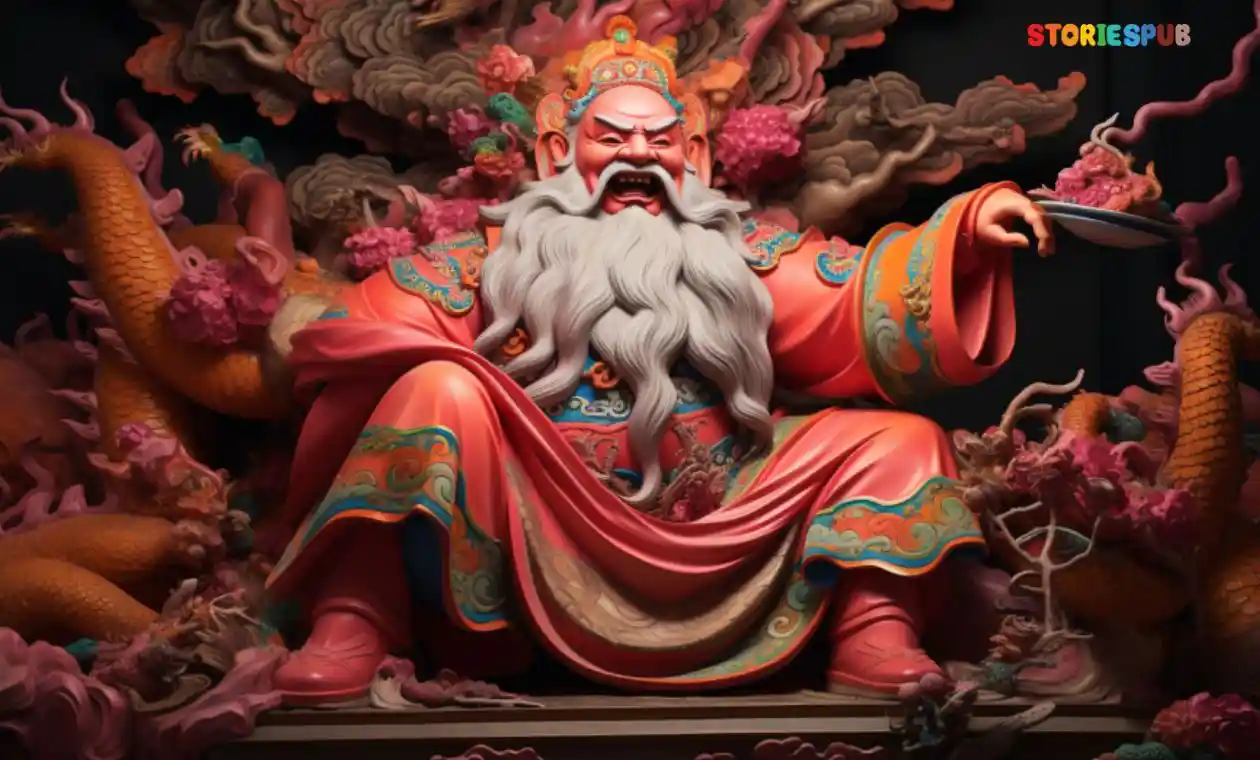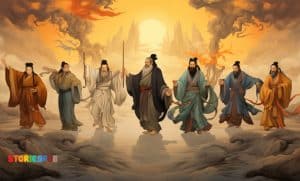
The story of Shou begins with a wise and virtuous man who lived in ancient China. He was known for his long and healthy life, and his reputation for longevity quickly spread throughout the land. People from all over China began to seek him out for advice and guidance, hoping to learn the secret to living a long and healthy life.
Shou was happy to share his wisdom with others, and over time, his teachings became more and more popular. People began to see him as a sage, a wise and learned man who had discovered the secret to eternal life. They began to revere him and hold him in high esteem, and soon, he became a figure of great importance in Chinese culture.
As Shou grew older, his reputation for longevity only continued to grow. He lived to an advanced age, far beyond what most people at the time could hope to achieve. His long and healthy life was seen as a testament to the power of his teachings, and people began to believe that he had been blessed by the heavens.
Eventually, Shou was elevated to the status of a deity. He became known as the God of Longevity, or Shouxing, and his image was depicted in temples and shrines across China. People began to worship him and offer him gifts and offerings in the hopes of receiving his blessings.
As the God of Longevity, Shouxing was seen as a powerful and benevolent figure. He was believed to have the power to bestow long life and good health on those who worshiped him and followed his teachings. He was seen as a bringer of good fortune and prosperity, and his image was often accompanied by symbols of longevity, such as the peach and the deer.
Over time, the worship of Shouxing became an important part of Chinese culture. People would visit temples and shrines dedicated to him, bringing offerings of incense, food, and other gifts. They would perform special ceremonies and rituals to honor him and ask for his blessings.
Today, the legend of Shou and the worship of Shouxing continue to be an important part of Chinese culture and mythology. The story of a wise and virtuous man who discovered the secret to eternal life is a powerful one, and it continues to inspire and guide people to this day. Through his teachings and his image, Shouxing remains a beloved and respected figure in Chinese culture, a symbol of wisdom, longevity, and good fortune.
The significance of the God of Longevity in Chinese mythology is immense. Shouxing is believed to be a bringer of good health, prosperity, and longevity. It is said that he has the power to bestow long life on those who worship him and follow his teachings.
The legend of Zhang Guo and Shouxing is one of the most well-known stories associated with the God of Longevity. It tells the tale of a man named Zhang Guo, who was seeking the secret to immortality.
Zhang Guo was a scholar and a philosopher, and he spent many years searching for the key to eternal life. He traveled to the tops of mountains, the depths of forests, and the shores of the sea, seeking wisdom and knowledge wherever he could find it.
One day, Zhang Guo found himself at the foot of a great mountain. He had heard that there was a wise man who lived at the top of the mountain, a man who had discovered the secret to immortality. Zhang Guo was eager to learn from this wise man, so he began the long and arduous climb up the mountain.
As he climbed higher and higher, the air grew thinner, and the path became more treacherous. But Zhang Guo was determined to reach the top, and he pressed on, driven by his desire for knowledge and wisdom.
Finally, after many hours of climbing, Zhang Guo reached the summit of the mountain. And there, sitting before him, was Shouxing, the God of Longevity.
Shouxing looked at Zhang Guo with kind and knowing eyes, and he welcomed him to his mountaintop home. Zhang Guo was amazed and overjoyed to be in the presence of such a wise and powerful being, and he begged Shouxing to teach him the secret to eternal life.
Shouxing smiled and nodded, and he began to teach Zhang Guo the way of the Tao. He showed him how to live in harmony with the natural world, how to cultivate inner peace and tranquility, and how to follow the path to enlightenment.
Zhang Guo listened intently to Shouxing’s teachings, and he began to see the world in a new light. He realized that the key to eternal life was not a magic potion or a mystical talisman, but rather a way of living that was grounded in wisdom, compassion, and understanding.
After many days of learning from Shouxing, Zhang Guo returned to the world below, transformed by his experience. He lived the rest of his life according to the teachings of the Tao, and he became known as a wise and compassionate sage, revered for his wisdom and his understanding of the natural world.
The God of Longevity, Shouxing, is known by many different names in Chinese mythology, each of which reflects a different aspect of his character and his powers. Two of the most common names for Shouxing are Shou Lao and Nanji Xianweng.
Shou Lao, which means “Old Longevity,” is one of the most well-known names for the God of Longevity. This name reflects Shouxing’s power to bring long life and good health to those who worship him. The word “shou” means longevity or long life, and it is a central aspect of Shouxing’s teachings and beliefs. By following the way of the Tao and living in harmony with nature, people can achieve the kind of long and healthy life that Shouxing represents.
Nanji Xianweng, which means “Elderly Immortal,” is another common name for Shouxing. This name reflects Shouxing’s status as a deity and his association with the realm of the gods. As an immortal being, Shouxing is believed to have the power to bestow blessings and good fortune on those who seek his guidance. The word “xianweng” means immortal or divine being, and it is a term of respect and reverence that is often used to describe Shouxing and other deities in Chinese mythology.
In addition to these two names, Shouxing is known by many other titles and epithets, each of which reflects a different aspect of his character and his teachings. Some of the most common include “Lord of Longevity,” “God of Life,” and “Master of Good Health.” These titles emphasize the importance of long life, good health, and prosperity in Chinese culture, and they reflect the enduring significance of Shouxing in the lives of the people who worship him.
The origin of the Shouxing myth is unclear, but it is believed to have originated in Taoist philosophy. The Taoist belief in the power of the universe and the importance of living in harmony with nature is reflected in the teachings of Shouxing.
There are many symbols associated with Shouxing, such as the peach, which is a symbol of longevity, and the deer, which is a symbol of wealth and prosperity.
In art, Shouxing is typically depicted as an elderly man with a long beard, wearing robes and carrying a staff or a peach. He is often accompanied by a deer, a crane, or a tortoise, which are all symbols of longevity.
There are many customs and traditions associated with Shouxing worship. People offer him incense, food, and other gifts in temples and shrines. They also perform special ceremonies and rituals to honor him and ask for his blessings.
Over time, the portrayal of Shouxing has evolved. In some depictions, he is shown as a young man, while in others, he is shown as an elderly man. Some images show him with a more serious expression, while others show him smiling and happy.
In Chinese mythology, Shouxing is closely related to other deities, such as the Three Star Gods, who are believed to bring good luck and prosperity, and the Eight Immortals, who represent different aspects of Taoist philosophy.
The story of the God of Longevity, Shouxing, is a fascinating one, steeped in mythology and symbolism. His teachings of living in harmony with nature and seeking a long and healthy life continue to inspire and guide people today. Through his image and legend, he remains a beloved and respected figure in Chinese culture and mythology.
Hey kids, how much did you like Shouxing: God of Longevity in Chinese Mythology? Please share your view in the comment box. Also, please share this story with your friends on social media so they can also enjoy it, and for more such Chinese Mythology, please bookmark storiespub.com.
Related Post :
FAQ about Shouxing
What is the significance of the God of Longevity in Chinese culture?
The God of Longevity is an important figure in Chinese culture, representing the desire for long life, good health, and prosperity. His teachings of living in harmony with nature and seeking a long and healthy life continue to inspire and guide people today.
What are some of the legends or stories associated with Shouxing?
One of the most famous legends associated with Shouxing tells of a man named Zhang Guo, who was seeking the secret to immortality. He traveled to the top of a mountain and encountered Shouxing, who taught him the way of the Tao and the path to eternal life.
What are some of the other names for Shouxing?
Shouxing is also known by other names such as Shou Lao, which means "Old Longevity," and Nanji Xianweng, which means "Elderly Immortal."
What is the origin of the Shouxing myth?
The origin of the Shouxing myth is unclear, but it is believed to have originated in Taoist philosophy. The Taoist belief in the power of the universe and the importance of living in harmony with nature is reflected in the teachings of Shouxing.
What are some of the symbols associated with Shouxing?
Some of the symbols associated with Shouxing include the peach, which is a symbol of longevity, and the deer, which is a symbol of wealth and prosperity.
How is Shouxing typically depicted in art?
In art, Shouxing is typically depicted as an elderly man with a long beard, wearing robes and carrying a staff or a peach. He is often accompanied by a deer, a crane, or a tortoise, which are all symbols of longevity.
What are some of the customs or traditions associated with Shouxing worship?
People offer him incense, food, and other gifts in temples and shrines. They also perform special ceremonies and rituals to honor him and ask for his blessings.
How has the portrayal of Shouxing evolved over time?
In some depictions, he is shown as a young man, while in others, he is shown as an elderly man. Some images show him with a more serious expression, while others show him smiling and happy.
What is the relationship between Shouxing and other deities in Chinese mythology?
In Chinese mythology, Shouxing is closely related to other deities, such as the Three Star Gods, who are believed to bring good luck and prosperity, and the Eight Immortals, who represent different aspects of Taoist philosophy.





